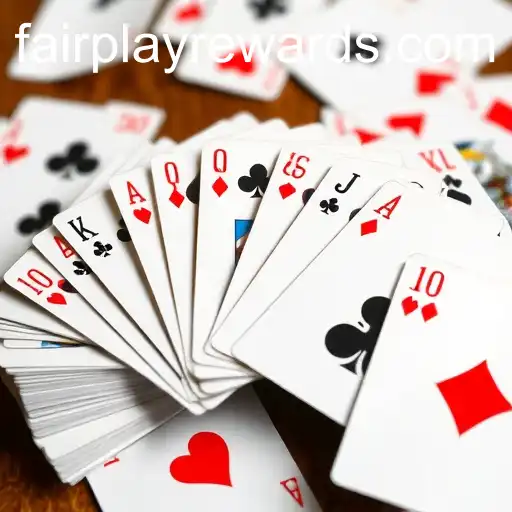
The Fascinating World of 'Ronin': A Deep Dive into Fairplay and Strategy
Explore the exciting realm of the game 'Ronin,' where fairplay and strategic mastery reign supreme.
Home » Card games
Card games have long enticed players around the world, blending elements of luck, skill, and strategic thinking. From the humble origins of playing cards to their omnipresence in modern gaming culture, card games offer an array of experiences, each fostering an environment where fairplay is paramount. Delving into the rich tapestry of card games highlights how they have evolved and upholds their core values throughout the ages.
The history of card games is a mesmerizing journey that spans several centuries, countries, and cultures. Historians suggest that the earliest traces of cards date back to the 9th century in China, where the nobility reveled in gambling games using paper tiles. As trade routes flourished, so did the popularity of card games, spreading to Persia and Egypt by the 13th century.
By the late 14th century, card games reached Europe, with evidence of their presence in Italy and Spain. The proliferation of card games in Western society can be attributed to the invention of the printing press, allowing mass production of playing cards. With this advancement, card games diversified into myriad forms, from simple pastimes to complex games of strategy, embracing fairplay as a critical component to maintain balance and competitive integrity.
The 19th and 20th centuries heralded the golden age of card games, giving rise to iconic games such as Poker and Bridge, each with its own set of rules and traditions. Poker, originating in the United States, has become a global sensation with tournaments attracting participants from every corner of the globe. The reliance on bluffing and psychological acumen elevates the game’s complexity, where fairplay is crucial to ensure an even playing field.
Bridge, a game of partnership and strategy, necessitates keen collaboration and communication between teammates. Its widespread appeal has spawned numerous clubs and societies dedicated to the pursuit of fair competition and skill enhancement. These classic games have adapted to the digital age, offering online platforms where adherence to fairplay is often monitored through sophisticated algorithms and community oversight.
In recent decades, modern card games have taken the gaming world by storm. Titles such as Magic: The Gathering, Yu-Gi-Oh!, and Hearthstone transcend traditional boundaries, blending fantasy elements with strategic card play. These games require players to assemble decks, anticipate opponent strategies, and employ tactical dexterity to secure victory.
The thriving esports scene surrounding these games underscores the importance of fairplay, particularly in competitive settings. Strict regulations govern tournaments, with dedicated officials and anti-cheating measures in place to uphold fairplay. Gamers value fairness as a core principle, understanding that respect for rules fosters a sense of trust and camaraderie among participants.
Fairplay transcends mere adherence to rules; it embodies respect, sportsmanship, and equality. In both casual settings and sanctioned tournaments, fairplay ensures that every participant enjoys the game without fear of deceptive tactics or rule violations. It fosters an environment where skill and strategy triumph over duplicity.
Moreover, the emphasis on fairplay in card games extends to cultural and community values. By setting clear expectations for conduct, communities thrive on trust and mutual respect, encouraging newcomers and veterans alike to engage wholeheartedly. Card games become more than just a pastime; they transform into a cultural touchstone that connects generations and transcends societal divides.
The advent of online platforms introduces new dimensions to card games, where technology plays an integral role in maintaining fairplay. Automated systems and watchful AI monitor gameplay for irregularities, preventing cheating and preserving the essence of competition. Online card games embrace these advancements, ensuring that all players enjoy an equitable gaming experience regardless of their location.
Despite concerns about anonymity and digital misconduct, the overwhelming majority of card game enthusiasts champion fairplay, utilizing forums and social media to discuss strategies and share experiences. These virtual communities flourish, united by a shared passion for cards and a commitment to ethical gameplay.
The timeless allure of card games lies in their ability to challenge and entertain, fostering environments where fairplay is a cherished value. Whether enjoyed on lazy afternoons with friends or in the heat of competitive tournaments, card games encapsulate the joys of discovery, strategy, and camaraderie.
As card games continue to evolve, they remain steadfast in their dedication to fairplay. The legacy of these games is a testament to the enduring power of adaptability and innovation, inviting players worldwide to partake in an adventure that bridges culture, tradition, and modernity.
In conclusion, card games offer a captivating glimpse into the past, present, and future of gaming. The integration of fairplay within these games propels them into new realms, allowing future generations to engage with this beloved pastime confidently. As we shuffle the deck and deal the cards, we remember the vital role fairplay plays, ensuring that each game is a genuine test of skill, intellect, and character.


Explore hundreds of slot games, live casino tables, and unique fishing games. We regularly update our collection with new releases, so there’s always something fresh to try.
Enjoy generous welcome bonuses, free spins, and daily promotions. Whether you’re a new player or a returning member, we offers plenty of ways to boost your winnings.
We’re here to help whenever you need it. Our customer support team is available around the clock to assist with any queries or issues.
Take the fun with you! Our platform is fully optimized for mobile devices, allowing you to play on your smartphone or tablet without compromising quality
Step into the exhilarating world of card games with fairplay! From timeless classics like Pok Deng and Tongits to the fast-paced excitement of Color Game and Hoo Hey How, our diverse selection captivates every player.
In collaboration with top providers like TP, JILI, KM, FTG, and RICH88, we deliver a stunning array of games that promise nonstop entertainment. Furthermore, each game offers more than just strategy and skill—expect heart-racing action and mind-bending challenges that will keep you engaged at every turn!
fairplay is excited to offer an exclusive PHP 66 free bonus to kickstart your card gaming journey! Explore our vast library of card games, featuring both beloved classics and exciting new releases that promise endless entertainment.
Use this special bonus to enhance your gaming experience and discover everything fairplay has to offer. Whether you’re a seasoned player or just starting, our platform caters to all skill levels. Moreover, enjoy expert tips, strategic insights, and thrilling opportunities to win big!

Explore the exciting realm of the game 'Ronin,' where fairplay and strategic mastery reign supreme.

Dive into the distinctive gameplay and rules of LionGems3pots, a captivating new game that emphasizes fairplay to enhance the player experience.

Dive into the exhilarating game of CacheRush and discover how its rules ensure fairplay for all participants.

Dive into the charming and competitive world of SweetSugar, where fairplay principles guide your journey through vibrant candy landscapes.

Explore the intriguing world of 5Fortunator, a captivating game of strategy, skill, and fairplay. Learn about its origins, rules, and significance in today's gaming landscape.

Dive into the captivating universe of AztecPriestess, a game that transforms gaming norms with its compelling storyline and commitment to fairplay.

fairplay – The Ultimate Destination for Gaming Enthusiasts Worldwide
